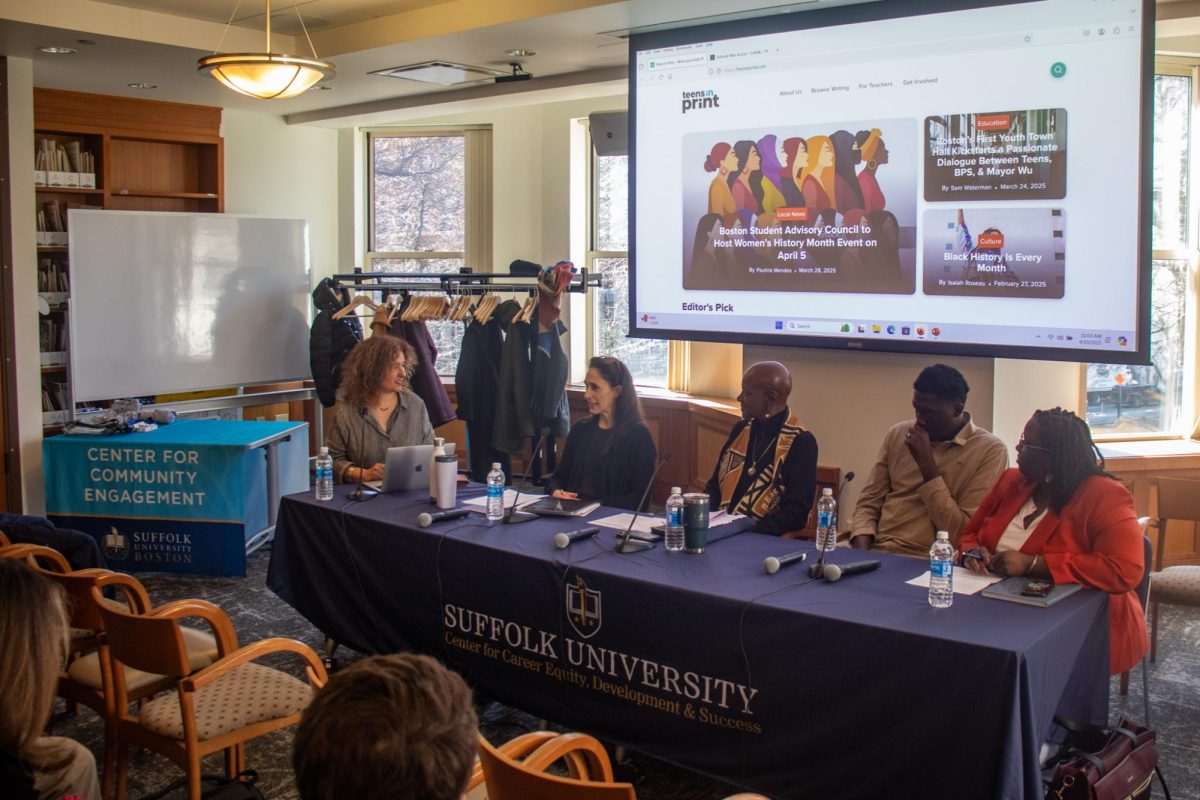Editor’s Note: Due to the current climate surrounding immigration and out of an abundance of caution to protect sources, student attorneys quoted within this story are not attributed by name.
In response to growing concern about deportations following multiple instances of federal immigration agents arresting migrants across the United States, student attorneys with the Immigrant Justice Clinic at Suffolk University Law School held a “Know Your Rights” training for community members April 17.
Presented in collaboration with the IJC, Counseling, Health and Wellness and the Center for Student Diversity and Inclusion, the training aimed to help people understand their constitutional rights under President Donald Trump’s executive orders about immigration — especially when interacting with U.S. Immigration and Customs Enforcement officers. Student attorneys also discussed First Amendment rights while participating in protests.
A person’s immigration status is fluid and there are many diverse forms of status with levels of legal protections, student attorneys said. Someone who immigrated to the U.S. may have had multiple statuses since they arrived, whether they sought asylum, entered under a visa or did not have status when they came to the country.
Everyone in the U.S., regardless of immigration status, is guaranteed certain rights under the law when interacting with law enforcement officers like ICE. These include the right to an attorney, the right to remain silent, the right to ask for a warrant and the right to make a phone call. “Red cards” were distributed during the event to training participants that list these constitutional rights and how to exercise them in both English and Spanish.
If an ICE agent knocks on a person’s door at home, that individual has the right to not answer the door. Student attorneys said that if a person does answer, they should ask the officers to slide a search warrant with a judge’s signature under the door or else the officers are not legally allowed to enter the home. Examples of the correct type of warrant were provided during the training to highlight the differences between a judicial warrant signed by a judge and an immigration warrant.
Student attorneys explained that in Massachusetts, when a person is stopped by officers while driving, only the driver needs to provide their name and address to the officer. The same primary rights apply if someone is asked by an officer for fingerprints, as it is common for officers to travel with portable fingerprinting machines. In that scenario, the driver has the right to refuse to be fingerprinted.
The Trump administration rescinded a policy implemented by former President Joe Biden’s administration that prevented ICE agents from entering “sensitive spaces” like schools, medical facilities, social service agencies and places of worship Jan. 20, allowing immigration officers to arrest people in those areas. Student attorneys went through the different rights students have in different areas on campus and protocols the university is using, provided by Suffolk’s General Counsel.
If ICE agents were to come to Suffolk, they are required to check in at the building’s designated security post, usually the front desk, where a security officer is. Security officers don’t have the authority to let ICE agents into a building, so they would have to call Suffolk’s chief of police to meet with the agents and determine if they were allowed to enter the building with a proper warrant.
There are few individuals with the authority to allow ICE agents to enter a Suffolk building, student attorneys said. Only the police chief, president of the university or a member of the general counsel can let ICE agents into a building on campus. Faculty and staff cannot let immigration officials into a university building. If ICE agents do make it inside, the same constitutional rights apply as when they were outside the building.
For people concerned about what to do if they are approached by immigration officials, student attorneys recommended different ways to be prepared depending on the situation. Generally, memorizing or writing down a trusted person’s phone number, like a family member, friend or lawyer, and ensuring that person knows where important immigration documents are located is best practice. If a person has a child in school, having someone designated to pick up that child in the event they can’t is recommended.
One student attorney noted that Tom Homan, the Trump administration’s “border czar,” said it was difficult for immigration officials to detain undocumented immigrants during raids because so many were aware of their constitutional rights. They emphasized that even if a person’s rights are violated, having an understanding of what those rights are can assist them in a legal case.
“The whole point of these trainings is to keep expanding that and to make it harder for ICE agents to continue doing their work, because they shouldn’t be doing their work,” said a student attorney.




















